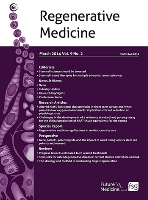
npj Regenerative Medicine
Scope & Guideline
Pioneering Research for Tomorrow's Therapies.
Introduction
Aims and Scopes
- Regenerative Mechanisms:
The journal emphasizes the biological and molecular mechanisms underlying tissue regeneration, including cellular signaling pathways, stem cell biology, and the role of the extracellular matrix. - Innovative Therapeutic Strategies:
Research articles often highlight novel therapeutic interventions, including cell-based therapies, biomaterials, and bioengineering approaches aimed at enhancing regenerative outcomes. - Translational Research:
A significant focus is on the translation of laboratory findings into clinical applications, assessing the effectiveness of regenerative therapies in preclinical and clinical settings. - Integrative Approaches:
The journal encourages interdisciplinary research that combines insights from biology, engineering, and medicine to foster innovative solutions for complex regenerative challenges. - Disease Models:
Studies often utilize various disease models to investigate regeneration processes and therapeutic efficacy, providing insights into specific conditions such as heart disease, neurological disorders, and musculoskeletal injuries.
Trending and Emerging
- Bioengineering and Biomaterials:
There is a growing emphasis on the development of advanced biomaterials and bioengineering techniques, including 3D printing and smart hydrogels, to enhance tissue regeneration and repair. - Immunomodulation Strategies:
Recent studies increasingly focus on immunomodulation as a strategy to improve regenerative outcomes, exploring how immune responses can be harnessed or modulated for better healing. - Cellular Reprogramming:
Emerging research highlights the potential of cellular reprogramming techniques, such as direct conversion of somatic cells into functional progenitor cells, as a promising avenue for regenerative therapies. - Microenvironment Engineering:
A trend towards the engineering of the tissue microenvironment to promote regeneration is evident, with studies investigating how biochemical and mechanical cues can influence stem cell behavior. - Personalized Medicine Approaches:
The integration of personalized medicine into regenerative practices is gaining traction, with research focusing on tailoring therapies based on individual patient profiles and disease mechanisms.
Declining or Waning
- Traditional Stem Cell Therapies:
There is a noticeable decrease in publications focused solely on traditional stem cell therapies without integration of advanced bioengineering or novel delivery systems. - Invasive Surgical Techniques:
Research related to invasive surgical techniques for tissue repair is becoming less frequent, with a shift towards less invasive, regenerative approaches such as biomaterials and scaffolds. - Single-Cell Studies:
Although single-cell analysis remains important, there has been a decline in studies focusing exclusively on single-cell genomics in the context of regeneration, as researchers increasingly adopt multi-omics approaches. - Basic Mechanistic Studies:
Publications that focus solely on basic mechanistic studies without direct translational relevance are becoming less common, as there is a stronger emphasis on applied research and clinical implications. - Animal Models for Early-Stage Research:
The reliance on animal models for early-stage research is waning in favor of human-relevant systems, including organoids and other advanced in vitro models.
Similar Journals

CELL RESEARCH
Exploring Innovations in Molecular BiologyCELL RESEARCH is a premier peer-reviewed journal dedicated to advancing the field of cell biology and molecular biology, published by SpringerNature. With an impressive impact factor and consistently ranking in the Q1 quartile for both cell biology and molecular biology, this journal serves as a pivotal resource for researchers, professionals, and students seeking to explore the latest discoveries and advancements in cellular mechanisms and their implications for health and disease. Since its inception in 1996, CELL RESEARCH has cultivated a distinguished reputation, currently boasting ranks in the top percentile of Scopus categories, reaffirming its influence and relevance to the scientific community. Although it is not an Open Access journal, its rigorous selection process ensures the publication of high-quality articles that contribute significantly to our understanding of life sciences. For those deeply engaged in the realms of biochemistry, genetics, and molecular biology, CELL RESEARCH is an essential conduit of innovative research and critical insights.

Organogenesis
Unveiling the Complexities of Organogenesis.Organogenesis is a leading journal published by Taylor & Francis Inc, dedicated to advancing the field of developmental biology and regenerative medicine. With an ISSN of 1547-6278 and E-ISSN 1555-8592, this journal spans an extensive research scope that includes embryology, transplantation, and biomedical engineering, distinguishing itself as a crucial platform for researchers and practitioners alike. Its impact is reflected in its performance across various categories in 2023, earning Q3 rankings in Biomedical Engineering and Embryology, Q4 in Developmental Biology, and Q2 in Transplantation, showcasing its reputable standing among peer journals. Moreover, with Scopus rankings indicating strong positioning in the fields of medicine and biochemistry, Organogenesis is essential for those looking to publish or stay updated on pioneering research. The journal facilitates rigorous peer-review and offers a forum for disseminating innovative findings, making it an invaluable resource for academics, professionals, and students committed to understanding the complexities of organism development.

Stem Cells International
Advancing the Frontiers of Stem Cell ResearchStem Cells International is a premier open access journal published by HINDAWI LTD, focusing on the rapidly evolving field of stem cell research. With an ISSN of 1687-966X and E-ISSN 1687-9678, this journal has been a vital resource since its inception in 2010, showcasing innovative studies and breakthroughs up to 2024. Positioned in Q3 in Cell Biology and Q2 in Molecular Biology for 2023, as well as well-ranked in the Scopus database, the journal serves as an essential platform for researchers, professionals, and students dedicated to exploring the implications of stem cell technology in regenerative medicine and biological research. The open access model ensures wide accessibility, fostering collaboration and knowledge-sharing across the scientific community, making it a cornerstone in advancing the understanding and application of stem cell science.

BMC Molecular and Cell Biology
Illuminating the pathways of modern biological research.BMC Molecular and Cell Biology is a forward-thinking open-access journal published by BMC, specializing in the vital fields of molecular biology and cell biology. Since its inception in 2019, the journal has carved a niche for itself, ranking in the Q3 quartile in both Cell Biology and Molecular Biology categories as of 2023. With an ISSN of N/A and an E-ISSN of 2661-8850, the journal provides a platform for groundbreaking research, high-quality reviews, and innovative methodologies. Situated in the United Kingdom, BMC Molecular and Cell Biology promotes a diverse range of studies, addressing fundamental questions in biology that resonate with both experts and new researchers alike. The journal's commitment to open access ensures that valuable findings are readily available to the global scientific community, fostering collaboration and knowledge-sharing across disciplines. Researchers aiming to contribute to the field of cell and molecular biology will find this journal an indispensable resource for both publishing and staying informed on the latest advances.

CELLULAR AND MOLECULAR LIFE SCIENCES
Pioneering Innovative Insights in Molecular BiologyCELLULAR AND MOLECULAR LIFE SCIENCES, published by SPRINGER BASEL AG, stands as a premier journal dedicated to advancing the field of cellular and molecular biology. With an impressive 2023 impact factor reflected in its Q1 rankings across key categories—including Cell Biology, Molecular Biology, and Pharmacology—it serves as a critical platform for researchers aiming to disseminate high-quality findings in these dynamic fields. Operated under an open access framework, the journal allows broader accessibility to groundbreaking research, fostering collaboration amongst scientists globally. Based in Switzerland, CELLULAR AND MOLECULAR LIFE SCIENCES has been at the forefront of scientific publishing since 1952, adapting to contemporary scientific challenges and trends, ultimately shaping the future of life sciences.

Regenerative Medicine
Charting New Territories in Regenerative MedicineRegenerative Medicine, published by Taylor & Francis Ltd, is a pivotal journal within the field of biomedical research, focusing on the innovative advances in regenerative and restored functions in human health. With an ISSN of 1746-0751 and an E-ISSN of 1746-076X, this esteemed journal boasts a commendable impact factor within its categories, notably holding the Q2 status in Embryology and Q3 in Biomedical Engineering as of 2023. Covering a broad spectrum of topics from stem cell research to tissue engineering, it serves as a crucial platform for interdisciplinary collaboration among researchers, professionals, and students dedicated to the regeneration of tissues and organs. Given its comprehensive scope from 2006 to 2024, the journal continues to attract high-quality manuscripts that advance the frontiers of knowledge in regenerative medicine. Researchers and practitioners alike are encouraged to engage with the latest findings and methodologies disseminated in this vital publication.

Journal of Stem Cells & Regenerative Medicine
Leading the Charge in Stem Cell InnovationThe Journal of Stem Cells & Regenerative Medicine is a leading publication dedicated to the advancing field of stem cell research and regenerative medicine. Established in India and published by JOURNAL STEM CELLS & REGENERATIVE MEDICINE, this Open Access journal has been available since 2007, providing researchers and practitioners with free and unrestricted access to high-quality articles. With an ISSN of 0973-7154, the journal is indexed in Scopus, featuring a wide array of topics and insights into biochemistry, biotechnology, cell biology, and molecular biology, as denoted by its relevant quartile rankings. This journal is committed to bridging the gap between laboratory research and clinical applications, making significant contributions to the scientific community. The convergence of innovative studies from 2010 to 2024 positions it as an invaluable resource for those looking to stay at the forefront of stem cell and regenerative medicine research.

Inflammation and Regeneration
Catalyzing innovation in cell biology and regenerative science.Inflammation and Regeneration is a prominent open-access journal published by BMC, focused on the discerning fields of immunology, cell biology, and regenerative medicine. Since its establishment in 2016, the journal has provided a platform for the dissemination of high-quality research, contributing significantly to the advancement of knowledge in inflammation processes and regenerative therapies. With a remarkable impact reflected in its Q1 quartile rankings in Cell Biology and Immunology for 2023, Inflammation and Regeneration stands out as a leading resource for researchers and practitioners. The journal's commitment to open access ensures that critical findings are readily available to a global audience, fostering collaboration and innovation in the scientific community. With a Scopus ranking that places it in the top 20% of its categories, Inflammation and Regeneration serves as an essential reference for those seeking to stay at the forefront of immunological research and its applications.

Journal of Orthopaedic Translation
Connecting research and clinical practice for impactful advancements.The Journal of Orthopaedic Translation is a leading peer-reviewed publication dedicated to advancing the field of orthopedics through innovative research and clinical implications. Published by Elsevier and available as an Open Access journal since 2013, it ensures that cutting-edge insights and findings are accessible to a global audience, promoting collaboration and knowledge sharing among researchers, professionals, and students. With an impressive impact factor, the journal has achieved a remarkable Q1 ranking in the categories of Orthopedics and Sports Medicine, placing it in the top 1% of journals in this highly specialized field. As of 2023, it ranks #5 out of 321 in conjunction with a notable 98th percentile achievement in Scopus Ranks, underscoring its reputation for excellence and relevance. Through a focus on both basic and applied research, the Journal of Orthopaedic Translation aims to bridge the gap between laboratory and clinical practice, contributing significantly to the evolving landscape of orthopedic health. Join us in exploring the transformative studies shaping the future of patient outcomes and surgical interventions.

MOLECULAR AND CELLULAR BIOCHEMISTRY
Connecting Molecular Insights to Clinical ApplicationsMOLECULAR AND CELLULAR BIOCHEMISTRY, an esteemed journal published by SPRINGER, serves as a prominent platform in the fields of biochemistry and molecular biology. With a history of dissemination since 1973, this journal has made significant contributions to the understanding of biochemical processes at the molecular level. The MOLECULAR AND CELLULAR BIOCHEMISTRY journal focuses on a myriad of topics including but not limited to cellular biochemistry, clinical biochemistry, and interdisciplinary approaches in medicine, boasting a commendable categorization in the 2023 Scopus ranks where it falls under Q3 in Cell Biology, Q2 in Clinical Biochemistry, Q1 in Medicine (miscellaneous), and Q2 in Molecular Biology. Although the journal is not open access, it provides access options through institutional subscriptions, making valuable research accessible to a wider audience. With its rigorous peer-review process and high impact within the scientific community, this journal aims to advance knowledge and stimulate exploration in biochemical research, making it essential reading for researchers, professionals, and students alike.